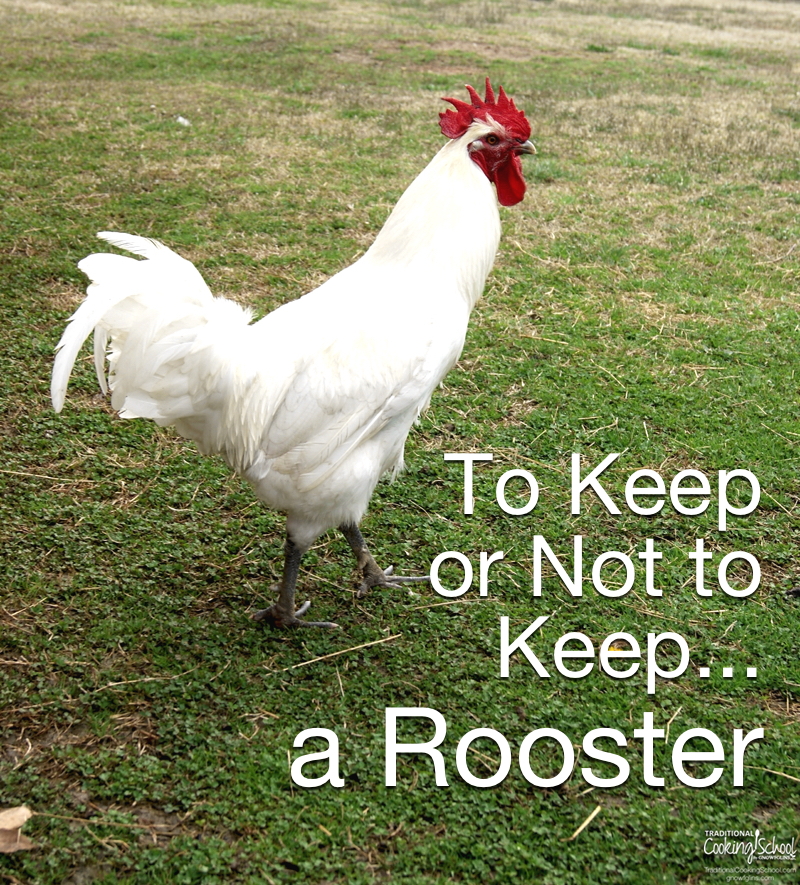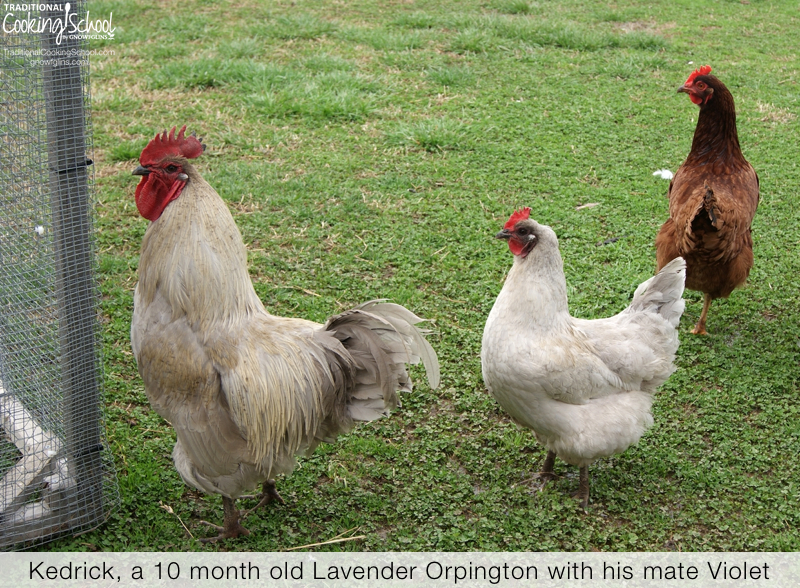
As new homesteaders who tend to become easily overwhelmed, my husband and I have a rule that we add just one new skill each year. This year’s skill is hatching our own chicks. And to do that, we need to keep a rooster. 😉
While doing our research on chickens, we heard a number of both good and bad things about roosters. On the one hand, we heard that roosters could be aggressive to the point of potentially inflicting injury to us and other birds. On the other hand, we heard that they could help protect our free-ranging hens while providing fertile eggs for hatching.
In the end, the good outweighed the bad… and we decided to give a rooster a chance. After nearly a year now, with not just one, but three roosters, here is our take on keeping a male bird.
Pros of Keeping a Rooster
Roosters provide a sustainable approach to keeping chickens.
In my opinion, having a rooster to fertilize eggs is like gardening with saved seed year after year instead of purchasing transplants from a nursery. With fertile eggs, hens (or an incubator, or both) can hatch chicks for you in the spring, and eliminate the need to purchase chicks locally or from a hatchery. Typically, only about half of the eggs that hatch will result in pullets. If you are comfortable culling your flock, this means you’ll have some cockerels to fill your freezer.
Roosters are fun to watch.
Not only are they beautiful, but roosters have a flamboyant personality. It is great fun to watch a pen full of young cockerels come into “rooster-hood” by attempting to crow, and chest bumping to establish authority. As they grow older, they will strut the barnyard as if they own the place. And according to them, they totally do 😉 It is amusing to watch them flirt with their girls, vying for their attention while performing their mating dance. They drop one wing to the ground and dance a little jig around their prospective mate, usually while she nonchalantly picks at the grass pretending not to notice.
Roosters provide protection for your flock.
A rooster will keep a close eye on his hens while foraging and free-ranging. Any time he notices anything amiss, he will sound the alarm and all will (or should) take cover. Should the flock ever be attacked, the rooster will take on the aggressor in an effort to protect his hens, even laying down his life if it should become necessary. Take care, however, since you may be viewed as the aggressor in some cases. This brings me to my next point.
Cons of Keeping a Rooster
They can be aggressive.
Because of their protective personality, if at any time they see you as a threat to themselves or to their flock, they will charge and attack. Watch out for those spurs — they can be painful! Roosters are also territorial. They want their own ladies, their own space in the coop, their own feeders, and their own water station. If you choose to keep more than one rooster, you may have problems if they begin to infringe on each other’s turf.

You only need a few.
If you purchase a straight run of chicks, about half of them will be cockerels, so you’ll need a plan to deal with the extra ones. If culling the flock and processing them as meat birds is not an option for you, find a way to give them new homes. Most chicken keepers are likely to be in the same boat as you are, though, so it can be very difficult to find someone willing to take them.
They can be noisy.
It is a myth that roosters crow only at the dawn. They do crow at dawn, but also in the hours proceeding the dawn, and many times during the day. A crow is not just a way of heralding the coming day — it is a way of announcing to all who are around, “I am here!” So, if you have more than one rooster, one crow is often followed by several others in response. “No, I am here!” “No I am here!!!”
A Few Pointers
A general rule of thumb is about one rooster per ten(ish) hens. My ratio is actually much smaller, though: one rooster for six birds in one pen, one to three in another. So far we’ve not had any major issues. If you haven’t seen roosters mate with hens, they can be rough enough to produce bald spots on the girls’ backs. Chicken “saddles” can be used as protection if you can get your pullets to keep them on.
If you are going to keep more than one rooster, it is best to have separate housing for them, and a large space for them to roam. The majority of our birds free range on ten acres and each rooster has his own coop that he shares with his own hens. I credit the fact we’ve not had any roosters injure one another to our large amount of space. Everyone has plenty of room.
Some breeds such as Buff Orpingtons, for example, produce reportedly “gentle” roosters. That being said, gentle for a rooster can still be somewhat aggressive. Our Captain Peacock doesn’t seem to mind me as much, but he does charge my husband on a regular basis.
If you are working in an enclosed pen or run with your roosters, tread carefully. I frequently approach mine with scratch, so they see me as a good thing. I also move slowly and deliberately, avoiding sudden movements that can be seen as threatening, and I avoid handling my hens if the rooster is nearby.
Do you keep a rooster? What breed? What are some tips you would give to a new chicken keeper?
...without giving up the foods you love or spending all day in the kitchen!

2 free books:
Eat God's Way
Ditch the Standard American Diet, get healthier & happier, and save money on groceries...
We only recommend products and services we wholeheartedly endorse. This post may contain special links through which we earn a small commission if you make a purchase (though your price is the same).


This was a great “read”, thank you. Homesteading, chickens and roosters will likely never be a part of my life, in reality anyway, but I wish it had been.
Thank you Yvette!
I have had chickens since childhood and I’m 75 years old. Unless I had a separate pen and no neighbors would NEVER own a rooster, and I’ve tried. Most are unpredictable, noisy and mutilate the hens to have their way with them. They are dangerously unpredicable and unless you de-spur them you run a great risk of harm to any children that might come in contact with them.
Thanks for sharing that Pam. I know of others who have had similar experiences.
Chicken love aint pretty. My Buff Orpingtons attack me daily, jumping up and kicking me in the calf. They sneak up from behind. I won’t mind culling my flock. I look forward to using my new hatchet.
I have three roosters, two hens and thirteen two month old chicks. An option for the tender hearted would be just leave the roosters out at night…the racoons will thank you.
It wouldn’t be a FARM around here without my roosters! I have 4, each with their own flock. If a rooster becomes aggressive, he is harvested or given away. But I love their crowing, really, and they do a nice job of fertilizing eggs. I have two bantam roos and two full-sized roos of various breeds. I keep a bantam flock because the hens tend to go broody more often and I use them to hatch out eggs from the full-sized hens. It’s just one more way to be self-sufficient and not dependent upon the grid.
I know Darlene! Every time I hear mine crow it makes me so happy. Glad to know about the bantams. I had not heard that before. I may look into that when we decide to expand our flock again.
We’ve been blessed to only have nice roosters, Rhode Island Reds and Barred Rocks. Along with advice mentioned, I would caution against a small rooster to hen ratio because that can wear out your hens. Also, I’ve heard that fertilized eggs are healthier to eat. Does anyone know if there is truth to that?
That is interesting Heidi that your RIRs are nice. My female RIRs are not and I always just assumed that males would be difficult. I had heard that too about fertilized eggs, but when I asked an experienced chicken keeper about it, she said there was no difference; so I really am not sure.
Mother Earth News did an article on eggs . They had them lab tested and all. Fertilized eggs have no cholesterol in them. Farm fresh and free range has low cholesterol compared to store bought eggs. Good article. Came out several years ago.
I am new to chickens and got my first Rhode Island Reds last spring. They are all four sweeties!!! I had fed them fresh grasshoppers while they were smaller so they think I’m an asset! I take them on walks close to the coop and they are easy enough to get back in the coop/yard when I’m done playing with them!
I have learnt to be very particular about my roosters and the breed. I have found that the Silver Spangled Hamburg roosters are some real gentle gems for the flock! I read how they alert the hens to chicken hawks and I have witnessed this several times. This year I have an old crossed SS Hamburg with another docile breed which I hatched under a cluck. He is so gentle and communicates by warning the hens if a hawk is over head and the hens run under trees or buildings to protect themselves. Since we started keeping that breed of rooster we never had any more hawk problems. Our Hamburgs never ever attacked people nor other roosters. But I am selective and watch their behavior for the most charming 2 young roosters and they get to be Kings of the laying flock. I am happy to say my 20 hens do not look beat up. Hamburgs are a bit smaller than my Golden Reds and Ameraucana hens and I think that helps too. In the past I have had Rhode Island Red and Production Red roosters and bantams and they are nasty “firery”… never again. Years ago one bantam rooster seemed to watch at the barn a distance away and the minute my young daughter walked out the back door of the house he loved to chase her; 3 strikes and he got replaced!!! My son even had the hamburg roosters eating out of his hand out in the yard and even jumping up on his shoulder to do tricks to get treats. Hamburgs never ever were cross.. They are a smart reserved smaller bird and I have been crossing them for many years… has given me some very “Pretty Boys” to manage my flock for healthy fertile eggs and protected happy hens! <3
Glad to hear about your recommendations June, thank you! I will look into some of those that you have mentioned.
Our first rooster, Carbonella, a silver laced cochin was jealous of me. Although he was the best social organizer for the hens, he didn’t make any points by attacking me several times. In protection for grandkids, we chose to cull him.
Our second rooster, Sable, a stunning black copper marans continues to be rooster perfection in behavior. We are ‘alpha’, he gets along wonderfully with us and is full duty ‘scout’ and social regulator.
Cheers,
izzi~avis
My first Roo was an Easter Egger names Hans that happened by accident. He was supposed to be a She and then started crowing. I have a mixed flock of four EE hens, a black australorp, and a silver laced wyandotte. He was very good to the girls, but had his moments with me and the hubs. He passed away last week from unknown circumstances, so I found a replacement Roo. Naveen (yes, there is a Disney theme here) is a RIR/Jersey Giant Cross and is so far the gentlest roo I’ve ever met. He’s in isolation in the garage right now, but is doing just fine! I will always have a roo for my girls!
I’m sorry about the loss of your rooster. Good luck with Naveen!
I kept one of the three roosters we ended up with after the last chick’s we bought in hopes of having our own ba is. One day after finding the hens tore open from his spurs – he’s gone. I never want to do that again. I’ll stick to my girls. The rooster for me wasn’t worth the watching the agony he was inflicting on my girls. They never even left the coop.
I’m sorry Tina. I know they can be rough on the girls.
My grandma kept chickens and i currently have a flock of 17.
1. Consider bantam cochins for a starter flock. Mine are smart, friendly, healthy, good moms. . My cochin and cochin mix bantam roosters are WONDERFUL!
2. My roosters are wonderful because I handle them daily. I give each one a kiss and a cuddle. Which means I swoop in, grab them securely, and hug. They understand that I am the ultimate boss. NEVER let a rooster scare you or intimidate you. If they try to go for you, grab a bath towel (I keep one right by the coops), toss it over the rooster, then pick up, hug, and speak softly to them. Again, enforce that you are a loving boss, but a boss.
3. Get a broom, and keep/carry it with you. Easy to separate birds who are being mean, without them thinking it is YOU.
4. Have a contingency plan if a rooster decides to go rogue. I had a farm that would take my roosters. Remember a mean rooster can leave scars. You MIGHT have to kill it.
5. Separate coops. DO NOT keep 2 roosters together with hens in the same small coop. They might be sweet for up to 2 years, But once the roosters start fighting, it will be to the death.
Just got my first “flock” of hens this past Friday night. I have one rooster who is a full blooded “game rooster”. I have the one rooster and 10 hens. “Jack” the rooster has already decided who his two favorites are going to be. I am not used to the sights and sounds of a rooster breeding a hen. It sounds like screams to me.. Anyway, they are all in a 7 x 6 coop at night, then in a 7 x 16 run area in the day. I am keeping them in the coop/run area until they get used to the idea that this is their home, this is where they eat, sleep and drink. What is your recommendation as to how long I need to keep them in the coop/run for them to get used to the idea that this is home. They will be free range, I just want them all to return “home”!! In the meantime, the RIR hen and the black Australorp is being mated more than the others, I think. The sooner that I can let them out to free range, the better for all of us!!!
We always coop train new chickens by locking them in their coop for 1 week. After that they will always return to their coop at night. In regards to roosters, each one has their own personality. We never keep any that are aggressive with us. There are plenty of roosters out there, so no need to keep one that is a jerk. We keep the roosters that are more laid back, but watchful of the flock. Our watch rooster has alerted us and actually foiled an attempted burglary at night by crowing and waking us up at 3:30AM. That’s the kind of rooster you want to keep. The ones with anger issues get culled. If you breed them, you want to pass on the “nice genes”.
I love all the comments. We just recently lost our beloved barred rock rooster. He took on two huge dogs to protect his ladies. Unfortunately, I was just driving up as it happened and couldn’t help him in time. He was the sweetest rooster and never aggressive. I’m so thankful we had eggs hatch recently and am hoping one of the cockerels will get his sweet personality. We, just moved to the “country” and have 10 acres and I am hoping to keep more than one rooster as well.